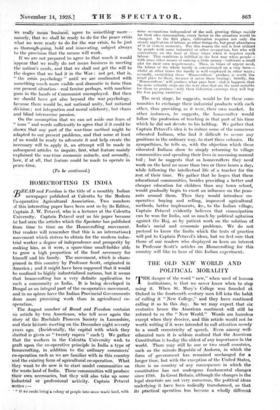. 435 newspaper published at Calcutta by the Modern Co-operative Agricultural
Association. Two numbers of this interesting paper have been sent Us by its Editor, Captain J. W. Petavel, who is a lecturer at the Calcutta University: Captain Petavel sent us his paper because he had seen the articles which the Spectator has published from time to time on the Homecrofting movement. 'Our readers will remember that this is an internationel movement which strives to obtain for the modern indus- trial worker a degree of independence and prosperity by making him, as it were, a spare-time small-holder able to grow a high proportion of the food necessary for himself and his family. The movement, which is 'cham- pioned in this country by Professor Scott, Originated in America ; And it might have been supposed that it would be confined to highly industrialized nations, but it seems that homecrofting has a very definite application to such a community as India. It is being developed in Bengal as an integral part of the co-operative movement, and in no sphere have the Indian Provincial Governments done more promising work than in agricultural co- operation. 1.. The August number of Bread and Freedom contains au i article by two Americans; who tell over again the dory' Of the Rochdale Pioneers Society in Lancashire, - - and their historic meeting on the December night seventy years ago.: (Incidentally, the capital with which they Started is given as "twenty rupees" each !) We gather that the workers in the Calcutta University wish to graft upon the co-operative principle in India a type of hornecrofting, in addition to the- Ordinary consumers' co-operation Such as we are familiar with in this.country 'and the existing form of agricultural co=operation. What they want to .do now i to start' model communities on the waste land of India. These connrinnities ivill'Produce their 'own necessaries,. -but they will also take np scrim' !industrial or professional actiVity. Captain Petavel writes •
fee'ecrithi Iningi colony of peoi)le" into sciroe Ntiliste land, With
iierne occupations independent- of-the soil,- growing things mainly for their own consumption, every factor in the situation would be changed. In the first place, cultivation requires not only the steady application of labour, as other things do, but great abundance of it at certain moments. For this reason the soil is best utilized by people with some industrial or other occupation, but who will concentrate on the land at those times when it requires much labour. This condition is fulfilled in the best way when people— with some other means of earning a little money—cultivate a small plot for their own 'requirements. Then, in times of urgent need, the labour of the whole family is concentrated on a tiny farm— whilst at other times the family is well employed in other ways ; secondly, everything these Homecrofters ' produce is worth the retail price to them, because it saves them buying ; thirdly, the • Homecrofters ' will produce what pays best—and it happens that the more valuable crops are the very ones that are the most suitable for them to produce—with their industrial earnings they will buy the less paying varieties."
The next stage, he suggests, would be for these com- munities to exchange their industrial products with each other, thus providing, as it were, their own market. In other instances, he suggests, the homecrofter would follow the profession of teaching in that part of his time which he did not devote to his holding. We gather that Captain Petavel's idea is to induce some of the numerous educated Indians, who find it difficult to secure any positions in the ordinary way, to start these colonies. He sympathizes, he tells us, with the objection which these educated Indians show to simply returning to village communities and spending their lives in unceasing manual toil ; but he suggests that as homecrofters they need work on the land no more than two or three hours a day, while following the intellectual life of a teacher for the rest of their time. We gather that he hopes that these educational communities, besides providing a better and cheaper education for children than any town school, would gradually begin to exert an influence on the peas- ants around them. Thus they would introduce co- operative buying and selling, improved agricultural methods, better implements, &c., to the Indian village. Captain Petavel evidently believes that emancipation can be won for India, not so much by political agitation against the Raj, as by patient work on the solution of India's social and economic problems. We do not pretend to know the limits which the tests of practice will put to Captain Petavel's ideas, but we feel sure that those of our readers who displayed so keen an interest in Professor Scott's articles on Homecrofting for this country will like to hear of this Indian experiment.


























































 Previous page
Previous page